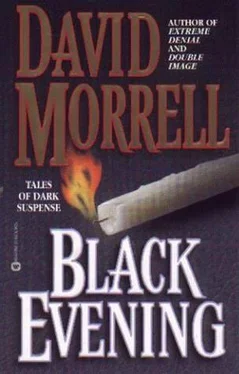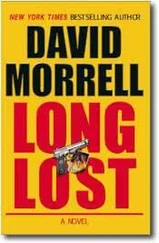David Morrell - Black Evening
Здесь есть возможность читать онлайн «David Morrell - Black Evening» весь текст электронной книги совершенно бесплатно (целиком полную версию без сокращений). В некоторых случаях можно слушать аудио, скачать через торрент в формате fb2 и присутствует краткое содержание. Жанр: Ужасы и Мистика, на английском языке. Описание произведения, (предисловие) а так же отзывы посетителей доступны на портале библиотеки ЛибКат.
- Название:Black Evening
- Автор:
- Жанр:
- Год:неизвестен
- ISBN:нет данных
- Рейтинг книги:4 / 5. Голосов: 1
-
Избранное:Добавить в избранное
- Отзывы:
-
Ваша оценка:
- 80
- 1
- 2
- 3
- 4
- 5
Black Evening: краткое содержание, описание и аннотация
Предлагаем к чтению аннотацию, описание, краткое содержание или предисловие (зависит от того, что написал сам автор книги «Black Evening»). Если вы не нашли необходимую информацию о книге — напишите в комментариях, мы постараемся отыскать её.
Black Evening — читать онлайн бесплатно полную книгу (весь текст) целиком
Ниже представлен текст книги, разбитый по страницам. Система сохранения места последней прочитанной страницы, позволяет с удобством читать онлайн бесплатно книгу «Black Evening», без необходимости каждый раз заново искать на чём Вы остановились. Поставьте закладку, и сможете в любой момент перейти на страницу, на которой закончили чтение.
Интервал:
Закладка:
I don't conclude the obvious: that the meteor carried spores that multiplied in the crater, which became a hollow eventually filled with cypresses. No – to me, the meteor was a cause but not an effect. I saw a pit among the cypresses, and from the pit, tiny mouths and writhing bodies resembling insects – how they wailed! – spewed. They clung to the leaves of the cypresses, flailed in anguish as they fell back, and instantly were replaced by other spewing, anguished souls.
Yes. Souls. For the meteor, I insist, was just the cause. To me, the effect was the opening of hell. The tiny, wailing mouths are the damned. As I am damned. Desperate to survive, to escape from the ultimate prison we call hell, a frantic sinner lunged. He caught my eye and stabbed my brain, the gateway to my soul. My soul. It festers. I paint to remove the pus.
I talk. That helps somehow. Clarisse writes it down while her female lover rubs my shoulders.
My paintings are brilliant. I'll be recognized as a genius, the way I had always dreamed.
At such a cost.
The headaches grow worse. The orange is more brilliant. The blue more disturbing.
I try my best. I urge myself to be stronger than Myers, whose endurance lasted only weeks. Van Dorn persisted for a year. Maybe genius is strength.
My brain swells. How it threatens to split my skull. The gaping mouths blossom.
The headaches! I tell myself to be strong. Another day. Another rush to complete another painting.
The sharp end of my paintbrush invites. Anything to lance my seething mental boil, to jab my eyes for the ecstasy of relief. But I have to endure.
On a table near my left hand, the scissors wait.
But not today. Or tomorrow.
I'll outlast Van Dorn.
After Matt's death in June of 1987, I collapsed. The day-after-day month-after-month tension of watching his painful decline had weakened the part of my brain that controls stress. A circuit breaker failed. No matter what I tried to do – take a walk, watch television, read, eat – my body was in a constant state of emergency. Stress chemicals rushed unchecked through me. Panic attacks repeatedly hit me. My mind swirling, my heart racing, all I could do was lie on my back and stare at the ceiling, experiences I wrote about in the non-fictional Fireflies (1988).
Gradually, with the love of my family and friends, I began to climb from the darkness. But the gap of three years between the publication of The League of Night and Fog in 1987 and The Fifth Professions 1990 gives an idea of the black hole that almost swallowed me. It took even longer for me to return to short fiction. The following story's unusual technique communicates the psychological state I was in. If you've ever taken a fiction-writing class, you know that there are three main viewpoints: first person, third-person limited, and third-person omniscient. Each has strengths and weaknesses. But there is a fourth viewpoint, one that is almost never used because of its limitations: the second person. Instead of "I" or "he" and "she," the author tells the story as "you." It's unconventional and problematic, but why not try it? I thought. Just once. To violate a taboo. To add to the lack of convention, I decided to use the present tense. But for a purpose. After all, the way a story is told ought to have something to do with its subject matter. Here, the main character is so stunned by what he has gone through that he feels detached from himself and thinks of himself as "you." Past horrors are constantly being replayed in the present tense of his savaged mind. "The Beautiful Uncut Hair of Graves" received the Horror Writers Association award for the best novella of 1991.
The Beautiful Uncut Hair of Graves
Despite the rain, you've been to the cemetery yet again, ignoring the cold autumn gusts slanting under your bowed umbrella, the drenched drab leaves blowing against your soaked pantlegs and shoes.
Two graves. You shiver, blinking through tears toward the freshly laid sod. There aren't any tombstones. There won't be for a year. But you imagine what the markers will look like, each birth date different, the death dates – God help you – the same. Simon and Esther Weinberg. Your parents. You silently mouth the kaddish prayers that rabbi Goldstein recited at the funeral. Losing strength, you turn to trudge back to your rain-beaded car, to throw your umbrella on the passenger seat and jab the button marked defroster , to try to control your trembling hands and somehow suppress your chest-swelling rage, your heart-numbing grief.
Eyes swollen from tears, you manage to drive back to your parents' home. An estate on Lake Michigan, north of Chicago, the mansion feels ghostly, hollow without its proper occupants. You cross the enormous vestibule and enter the oak-paneled study. One wall is lined with books, another with photographs of your precious father shaking hands with local and national dignitaries, even a president. As you sit at the massive desk to resume sorting through your father's papers, the last of them, the documents unsealed from your parents' safe-deposit box, your wife appears in the study's doorway, a coffee cup in her hand. She slumps against the wall and frowns as she did when you obeyed your repeated, so intense compulsion to go back – yet again – to the cemetery.
"Why?" she asks.
You squint up from the documents. "Isn't it obvious? I feel the need to be with them."
"That's not what I meant," Rebecca says. She's forty-nine, tall, with dark hair, a narrow face, and pensive eyes. "All the work you've been doing. All the documents and the meetings. All the phone calls. Can't you let yourself relax? You look terrible."
"How the hell should I look? My father's chest was crushed. My mother's head was… The drunken bastard who hit their car got away with just a few stitches."
"Not what I meant," Rebecca repeats. Using two hands, both of them shaky, she raises the coffee cup to her lips. "Don't make sympathy sound like an accusation. You've got every right to look terrible. It's bad enough to lose one parent, let alone two at once , and the way they died was" – she shakes her head – "obscene. But what you're doing, your compulsion to… I'm afraid you'll push yourself until you collapse. Don't torture yourself. Your father assigned an executor for his estate, a perfectly competent lawyer from his firm. Let the man do his job. I grant, you're a wonderful attorney, but right now it's time to let someone else take charge. For God's sake, Jacob – and if not for God, then for me – get some rest."
You sigh, knowing she means well and wants only what's best for you. But she doesn't understand: you need to keep busy, you need to distract yourself with minutiae so that your mind doesn't snap from confronting the full horror of losing your parents.
"I'm almost finished," you say. "Just a few more documents from the safe-deposit box. Then I promise I'll try to rest. A bath sounds… Lord, I still can't believe… How much I miss… Pour me a Scotch. I think my nerves need numbing."
"I'll have one with you."
As Rebecca crosses the study toward the liquor cabinet, you glance down toward the next document: a faded copy of your birth certificate. You shake your head. "Dad kept everything . What a packrat." Your tone is bittersweet, your throat tight with affection. "That's why his estate's so hard to sort through. It's so difficult to tell what's important, what's sentimental, and what's just…"
You glance at the next document, almost set it aside, take another look, frown, feel what seems to be a frozen fishhook in your stomach, and murmur, "God." Your breathing fails.
"Jacob?" Your wife turns from pouring the Scotch and hurriedly sets down the bottle, rushing toward you. "What's wrong? Your face. You're as gray as – "
Читать дальшеИнтервал:
Закладка:
Похожие книги на «Black Evening»
Представляем Вашему вниманию похожие книги на «Black Evening» списком для выбора. Мы отобрали схожую по названию и смыслу литературу в надежде предоставить читателям больше вариантов отыскать новые, интересные, ещё непрочитанные произведения.
Обсуждение, отзывы о книге «Black Evening» и просто собственные мнения читателей. Оставьте ваши комментарии, напишите, что Вы думаете о произведении, его смысле или главных героях. Укажите что конкретно понравилось, а что нет, и почему Вы так считаете.












